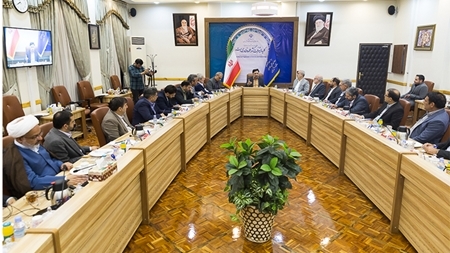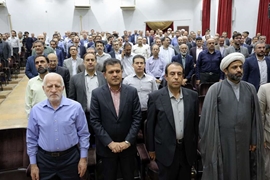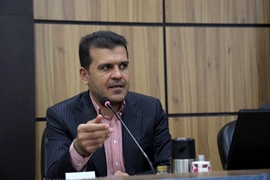Dehghani: supporting the creation of large knowledge-based consortia with the support of Kerman large industries
A group meeting of Kerman's large industry activists was held with the Vice President of Science, Technology and Knowledge-Based Economy.

In a meeting that was held in the presence of Ruhollah Dehghani, Vice President of Science, Technology and Knowledge-Based Economy, Mohammad Mehdi Fadakar, Governor of Kerman, and several managers of large and influential industries in the province, the role and capacities of the Knowledge-Based Production Leap Law for optimization and penetration of innovation and technology in were investigated Kerman industries.
Referring to the strategic and key role of the industries of Kerman province in the advancement of the country's economy, Ruhollah Dehghani, the vice president of science, technology and knowledge-based economy, said: the country's economy owes a significant share of its development and value creation to playing a key and effective role. Industries are in Kerman province. This meeting hosted a group of managers of influential industries in the country so that while creating fields for connecting innovation and knowledge-based technology to these industries, support these industries for the development of the ecosystem in innovation and technology to witness the creation of a huge amount of added value, employment and economic growth.
Dehghani, pointing out that the knowledge-based economy has been one of the few fields with sustainable progress in recent years, said: the knowledge-based movement, whose leadership has been in existence for more than two decades, emphasizes the importance and necessity of supporting it, always through these supports from the highest-ranking official of the country has experienced the growth process with unprecedented speed and intensity; Looking at the statistics and analysis, we will notice the upward slope of this growth during the last two decades.
Dehghani continued: We have nearly 9,000 knowledge-based companies in the country, which have now reached a desirable mass to influence employment, gross domestic product, and overall advancement of the country's economy. Last year, these companies had sales of nearly 480 thousand billion tomans, and now the time has come to seriously pay attention to the importance and position of these companies in the future of the country and the fate of traditional industries. These companies are overtaking traditional companies at a high speed. It won't be long before the biggest famous industries will give way to knowledge-based companies, and the secret of their sustainability and growth is mixing with knowledge-based industries and the penetration of technology in the body of these industries.
The head of the National Elites Foundation, pointing out that intangible and intellectual assets are the most important and efficient assets and tools of knowledge-based companies, continued: We are talking about knowledge, innovation and brainware as the real assets and values of this field. The difference between 9,000 knowledge-based companies and traditional industries is at this point, and innovation has made knowledge-based companies to be decisive in the future horizon of the country's economy.
He stated that in the era of oil development, the cycle of a resource-oriented economy and selling raw materials has reached its peak, and industries have no choice but to rely on knowledge-based wings. Energy resources are always decreasing and they remind us that shortly, we have no choice but to buy and consume energy at the global rate. On the other hand, due to the increase in costs, the development of human resources equipped with expertise, knowledge and innovation, and the increasing development of financing systems and new concepts in creating added value, we must think of new ways to create wealth and value.
Emphasizing the necessity of innovation of knowledge-based companies in industries to improve productivity, he said: the input resources of the industry, such as energy, are always becoming more expensive, and what is the first word in the market and industry today is new energy. According to the macro trends and current of the world, increasing productivity has become the key to the survival of industries and a serious move towards benefiting from innovation and technology to increase productivity is inevitable.
The vice president of science, technology and knowledge-based economy, pointing to the necessity of benefiting from the technology of knowledge-based companies and using brainware reserves to move the wheels of the economy, said: the country with a large elite society, capable knowledge-based companies, has the possibility of creating a transformation in the creation of added value and has employment. We must use all the brainware capacities inside and outside the country. Most of the elite who reside abroad are willing and ready to serve their country, but the industries must open the doors of activity and effectiveness to them.
The need for industries to welcome market creation for knowledge-based companies
Dehghani considered the market of knowledge-based products and the innovative financing system as two urgent needs to advance the country's economy with the help of technology and innovation and said: There are tools and requirements for creating a knowledge-based market and shaping the financing system, but it is necessary for large industries and enterprises and economic influencers should come to work and welcome the capacity and capability of knowledge-based companies.
The knowledge-based production leap law has given various tools to implement innovative financing, and one of these tools is tax credits.
Lifting the ban on investment in specific and case-specific fields is one of the other possibilities and powers that are foreseen in this law, according to the opinion of the Strategic Council of Technologies. The first-time production working group is another facility that provides a good opportunity to improve the share of industries in knowledge-based production.
Referring to the formation of large knowledge-based consortia for the realization of large projects, he said: we can take a lasting and decisive action with the cooperation and synergy of industries and large economic enterprises so that its fruits and effects will be good in the development of the country's economy and people's livelihood.
He added: cooperation agreements with large industries to form large knowledge-based consortia are a step in this direction. Last year, we concluded contracts worth 2 billion dollars with petrochemical companies, which will allow serious investment and cooperation for specific, large and lasting projects.
Dehghani reminded: If innovation and knowledge-based branches are linked to a large industry, we will witness an effective event, while the investments will not be scattered and the country's resources will not be wasted, in addition, most of the government's investments will be spent on risk reduction.
The vice president of science, technology and knowledge-based economy, referring to the enormous potential of Kerman province for the development of a knowledge-based economy, said: "We hope that with the help of Kerman's large industries, serious and impactful events will take place in the country's knowledge-based economy." If we provide the ground for the impact and creation of knowledge-based companies, we have provided the opportunity to revive elite and innovative people, and by reviving the innovation and creativity of every elite person, it is as if we have revived a nation. The greatest desire and concern of the elites of this society is the existence of an opportunity to influence, and if we can create this opportunity, we will witness its blessings and effects in the transformation of society.
The readiness of the industries of Kerman province to support and benefit from the capacity of knowledge-based companies
Mohammad Mahdi Fadakar, the governor of Kerman, also pointed out the role of Kerman's large industries in the knowledge-based economy with the help of the knowledge-based production leap law and said: The knowledge-based production leap law is one of the good measures to support the technological and innovative capacities of the country. The articles and notes of this law create a good opportunity for the development of a knowledge-based economy.
He added: Good companies are operating in the province that can be used to increase productivity and create employment. The capacities of the law must help these companies.
Fadakar, stating that the large industries of the province become meaningful with the use of technology and innovation of knowledge-based companies, continued: A significant percentage of Kerman companies are companies that can be serious players in the economic field because they have very high values.
Capacities of knowledge-based production leap law in promoting industries
In this meeting, Mehdi Eliyasi, Deputy of Policy and Development in the Vice Presidency of Science, Technology and Knowledge-Based Economy, introduced the capacities and opportunities created for industries to benefit from innovation and the benefits of supporting knowledge-based companies. In the knowledge-based production jump law, it has been resolved and also in the knowledge-based production jump law, two axes of knowledge-based economy and driving companies have been given serious attention.
He added: In the knowledge-based production leap law, attention has been paid to the provincial view and the powers of the provincial departments in the ecosystem of technology and innovation.
Eliyasi continued: The Strategic Council of Knowledge-Based Technologies and Productions was formed with the personal support of the president and the recognition of the parliament that the powers of this council are at the same level as the economic council and it brings a very good operational and executive capacity. To benefit from this capacity, we need the participation and role-playing of large companies.
The Deputy of Policy and Development in the Vice-Presidency of Science, stating that one of the targets and activities in the Knowledge-Based Production Leap Law is Prominent companies, continued: In this new approach, industries are supported in the shadow of investment in research and development. The topic of research and development must be technology and innovation, and these plans must be clearly defined from the beginning in the form of a written and specific program.
Eliyasi continued: We are trying to improve the level of technological competitiveness of large companies and industries in the country.
Eliyasi stated: supporting first-time production, prohibiting the competition between the public sector and public institutions in certain cases, receiving tax credits according to the expenses incurred for research and development, receiving tax credits for direct investment in knowledge-based companies, supporting technological investment plans that are possible The investment of development organizations as well as the possibility of joint investment of the bank and the innovation and prosperity fund in technological projects are only a small part of the advantages of this law for industries.
Vice Presidency of Science, Technology and Knowledge-Based Economy














comment